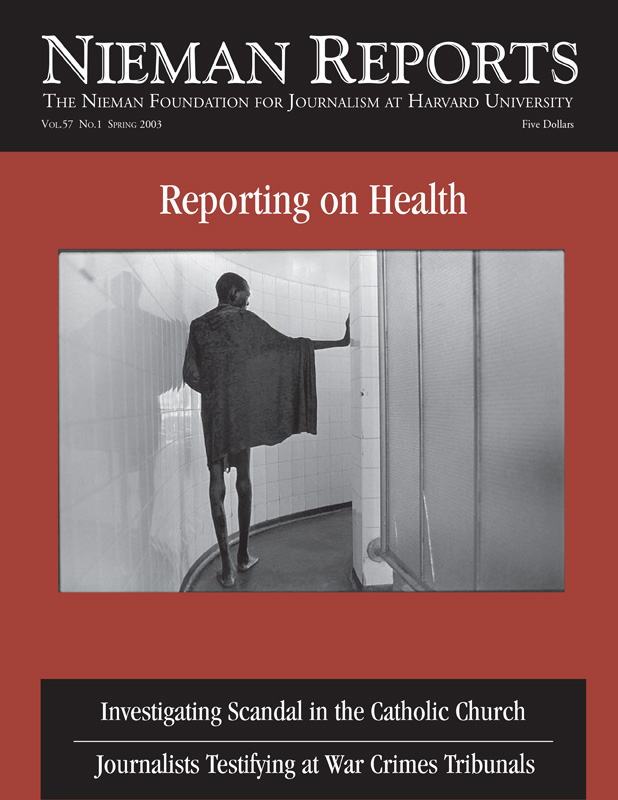Journalists Testifying at War Crimes Tribunals
Should journalists who cover war be required to testify before tribunals in which cases involving those accused of war crimes are heard? A December 2002 ruling by the United Nations International Criminal Tribunal for the former Yugoslavia clarified that reporters cannot routinely be subpoenaed. But this ruling did not end debate among journalists about whether they should testify, even if not forced to do so.
Some who have reported on war crimes share their perspectives about various journalistic and ethical issues that arise. Nina Bernstein, now a New York Times reporter, writes about when she was asked to provide evidence from reporting she did in Bosnia in 1992 for Newsday. That request—and her consideration of it—led to an abiding interest in this issue, which she written about for the Times. Here she describes her experience and the reaction of other journalists to it. Excerpts follow from a brief filed by a coalition of news organizations to argue against the court’s ability to compel journalists to testify. Roy Gutman, whose reporting for Newsday disclosed systematic killing at concentration camps in northern Bosnia, urges journalists to report more about how the tribunal process treats journalists and what happens when journalists testify. Excerpts from his witness statement and Boston Globe reporter Elizabeth Neuffer’s affidavit accompany his story.
Lindsey Hilsum, diplomatic correspondent for Britain’s Channel 4 news, explains her decision to testify about her reporting in Rwanda and describes why British reporters are more likely to agree to testify than are their American counterparts. Kemal Kurspahic, the former editor in chief of the Sarajevo daily Oslobodjenje, agrees with the court’s decision not to compel journalists to testify, but also strongly supports reporters who went to The Hague as witnesses for the prosecution. “There are some things in this world that a person simply can’t be neutral about,” he writes. In reviewing Kurspahic’s recent book, “Prime Time Crime: Balkan Media in War and Peace,” Senad Pecanin, editor in chief of Dani magazine in Sarajevo, says that it “provides excellent testimony to the devastating things that happen to journalists when they fall under the control of authoritarian leaders.”
Bill Berkeley, now a reporter for The New York Times who reported as a freelancer in Africa during the early 1990’s, takes us through his reversal in thinking as he first decides he will testify about what he reported from Rwanda, then decides against it. Russell Mills, former publisher of the Ottawa Citizen and currently a Nieman Fellow, shares his idea about creating a journalistic organization with the ability to do case-by-case reviews before a subpoena is issued, when an international court seeks evidence from a reporter.
Coverage of War
Photojournalist Peter Turnley and former ABC News correspondent Bob Zelnick present through images and words ways for us to visualize and reflect on casualties of war, both military and civilian. Turnley’s photographs show scenes of death at the end of the Persian Gulf War; Zelnick’s article recalls various ways in which civilian casualties have been reported during previous wars.


